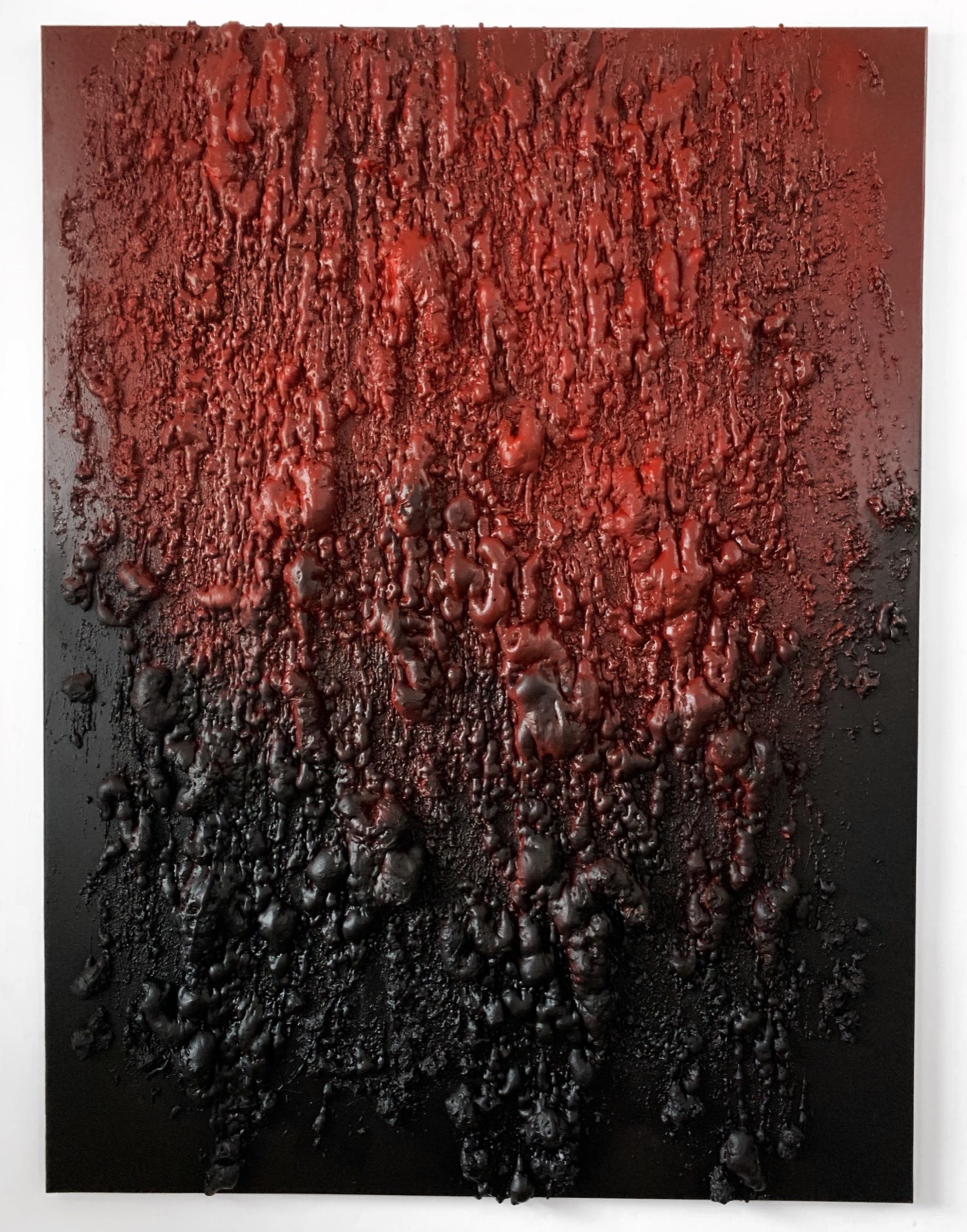Since 2021 color has been incorporated (previously seen in the Red and Blue painting Series) which is representative of the Native American side of myself, plus being representative of Africa and Black, being the consistent foundation of a black woman.
Black appears prominently in your art. Could you explain its significance and symbolism in your work?
The symbolism comes from my African ancestry, and my appreciation for minimalism, this is something that I explore throughout my paintings, hence the red and blue series. However, Black is always my foundation, it represents the calm and my ancestry is what I take homage to specifically, women. The two women who are extremely powerful to me which makes me who I am as an artist today Anticlone in fact is who Anticlone and Sade English LTD in in memory of, both my mother and grandmother who are both Jamaican, black women , black history and black and a color for my identity fundamentally and takes center stage with everything I do.
Anticlone is described as a concept that does not conform to society. What societal norms or conventions do you aim to challenge with this project?
What I wish to challenge is mainly the ideas on what the fashion and arts industry is today. The realities are things such as trends that are consistently appearing every year. The fashion industry for example still is heavily influenced via trend forecaster, trends keeping focus and terms such as, womenswear and menswear is still used. Many roles and terms I personallyI find quite out-dated and unnecessary. Anticlone is a part of a movement which supports and represents change and a new way of thinking. Something that numerous individuals have been doing beforehand is conforming to what is expected.
Anticlone is simply a part of making history in platforming and increasing awareness on who deserves to be seen and heard in hope to replace these outdated trends and terminologies. Above all it is to be representative for society to recognise that there are other options other than the conformed enforced terms which society has been using for countless years.
Anticlone podcast is due for Frieze 2023, what to expect?
Evolving from Anticlone in conversation, which is a live panel discussion as Sade is both the mediator interviews invited guests, originally developing from Soho house, 2020 where the first takeover launched, the podcast is a revolution of this. Anti-podcast is a sit down conversation with in cities guest, have a intimate conversation with Sade English, discussing their experience, views on their industry which they are in, and above all shares real and genuine insight to their word, enabling the listener to take inspiring, and eye opening information on the realities of navigating industry. Often listeners can feel far removed and most podcasts are somewhat formal when surrounding the arts, the Antipodcast is anti this, self explanatory but is to enable the viewer, guest and Sade English to have a conversation that feels informal, intimate and honest, above all it is to feel inspired.
What is Sade working on at the moment?
I am currently planning my new solo show for 2024, as well as designing and working on my new SADE ENGLISH clothing collection for the new year; a first since my last wearable art collection in 2019 this will be a ready-to-wear collection, focusing on tailoring, outerwear and minimal designs and fits. An everyday wardrobe for all paying homage to classical minimalism with elements of avant garde signature, my ancestry as well as my chapter which has enabled me to the next project I am working on, is for frieze 2023, for The Takeover III, Black light theater.
Anticlone Gallery Presents ‘Black + Light Theater, The Takeover III’. In partnership with Mandrake for Frieze Week London, from 9th – October – 15th October 2023. Anticlone presents a week-long program of events that showcases multidisciplinary Avant-garde Artists specializing in sound, performance, moving images and installations. ‘The Takeover III’ invites you to an overall Anticlone immersive experience, inspired by the Anticlone concept that has evolved to become a movement and gallery which holds an unparalleled selection of unique, non-conformist Artists and creatives. Anticlone founding Director, Artist, and Curator Sade English invites her first co-curator Maria Abramenko, since launching in November 2020.
‘Black Light Theater, The Takeover III’ for the first time invites and welcomes external Artists to quite literally take over The Mandrake Theater as well as showcase alongside the Anticlone collection and archive curated by Sade and Maria. Each Artist involved is unique in their own right, and collectively powerfully aligned through embodying the Anticlone non-conformist concept.
Alongside the theater programme, there will be a new curation of artworks installed within the walls of The Mandrake; Exploring both Black, Light, and Identity within their works. The title pays homage to ‘Black light theater’; from French avant-garde directors from the 1950s; artists will explore the use of black box theater augmented by white light and black light illusions. Stressing the importance of the value of expression without these established and emerging titles. Anticlone Gallery removes and blurs the terminology altogether, enabling the viewer and collector to appreciate Art for what it truly is, expression. Artists included are Alban Adam, Chad Curry, Edoardo Dionea Cicconi, Gaika, Joshua Woolford, Krissie Marie Heliodore, Lulu Wang, Marie Sauvage, Othello De’Souza Hartley, and Sade English. Stay tuned for full program details, and dates coming soon.
 https://www.nastymagazine.com/wp-content/uploads/2022/09/Screenshot-2022-09-07-at-19.57.03.png
688
1091
admin
https://www.nastymagazine.com/wp-content/uploads/2015/02/new-logo-basker-WHITE4.png
admin2022-09-08 11:04:092022-09-07 20:18:58“Dero” by Heith
https://www.nastymagazine.com/wp-content/uploads/2022/09/Screenshot-2022-09-07-at-19.57.03.png
688
1091
admin
https://www.nastymagazine.com/wp-content/uploads/2015/02/new-logo-basker-WHITE4.png
admin2022-09-08 11:04:092022-09-07 20:18:58“Dero” by Heith












